- Home
- Milan Kundera
Ignorance Page 3
Ignorance Read online
Page 3
Meanwhile, the waiter appears in the doorway with ten half-liter mugs of beer, five in each hand,
36
a great athletic feat that provokes applause and laughter. They all lift their mugs and toast: "Health to Irena! Health to the daughter who's returned!"
Irena takes a small sip of beer, thinking: And suppose it were Gustaf offering them the wine? Would they have turned it down? Certainly not. Rejecting the wine was rejecting her. Her as the person she is now, coming back after so many years.
And that was exactly her gamble: that they'd accept her as the person she is now, coming back. She left here as a naive young woman, and she has come back mature, with a life behind her, a difficult life that she's proud of. She means to do all she can to get them to accept her with her experiences of the past twenty years, with her convictions, her ideas; it'll be double or nothing: either she succeeds in being among them as the person she has become, or else she won't stay. She arranged this gathering as the starting point in her campaign. They can drink beer if they insist, that doesn't faze her; what matters to her is choosing the topic of conversation herself and being heard.
37
But time is passing, the women are all talking at once, and it is nearly impossible to have a conversation, much less to impose its subject. She tries delicately to take up topics they raise and lead them toward what she wants to tell them, but she fails: as soon as her remarks move away from their own concerns, no one listens.
The waiter has already brought the second round of beer; her first mug is still standing on the table with its foam collapsed as if disgraced alongside the exuberant foam of the fresh mug. Irena faults herself for having lost her taste for beer; in France she learned to savor a drink by small mouthfuls, and is no longer used to bolting great quantities of liquid as beer-loving requires. She raises the mug to her lips and forces herself to take two, three swigs in a row. Just then one woman—the oldest of them all, about sixty—gently puts her hand to Irena's lips and wipes away the flecks of foam left there.
"Don't force yourself," she tells her. "Suppose we have a little wine ourselves? It would be idiotic to pass up such a good wine," and she asks the waiter to open one of the bottles still standing untouched on the long table.
11
Milada had been a colleague of Martin's, working at the same institute. Irena had recognized her when she first appeared at the door of the room, but only now, each of them with a wine glass in hand, is she able to talk to her. She looks at her: Milada still has the same shape face (round), the same dark hair, the same hairstyle (also round, covering the ears and falling to below the chin). She appears not to have changed; however, when she begins to speak, her face is abruptly transformed: her skin creases and creases again, her upper lip shows fine vertical lines, while wrinkles on her cheeks and chin shift rapidly with every expression. Irena thinks Milada certainly must not realize this: people don't talk to themselves in front of a mirror; she would see her own face only when it is at rest, with the skin nearly smooth; every mirror in the world would have her believe that she is still beautiful.
As she savors the wine, Milada says (and instantly, on her lovely face, the wrinkles spring forth and start to dance): "It's not easy, returning, is it?"
"They can't understand that we left without the slightest hope of coming back. We did our best to drop anchor where we were. Do you know Skacel?"
"The poet?"
"There's a stanza where he talks about his sadness; he says he wants to build a house out of it and lock himself inside for three hundred years. Three hundred years. We all saw a three-hundred-year-long tunnel stretching ahead of us."
"Sure, we did too, here."
"So then why isn't anyone willing to acknowledge that?"
"Because people revise their feelings if the feelings were wrong. If history has disproved them."
"And then, too: everybody thinks we left to get ourselves an easy life. They don't know how hard it is to carve out a little place for yourself in a foreign world. Can you imagine—leaving your country with a baby and with another one in your belly. Losing your husband. Raising your two daughters with no money ..."
She falls silent, and Milada says: "It makes no sense to tell them all that. Even until just lately, everybody was arguing about who had the hard-
est time under the old regime. Everybody wanted to be acknowledged as a victim. But those suffering-contests are over now. These days people brag about success, not about suffering. So if they're prepared to respect you now, it's not for the hard life you've had, it's because they see you've got yourself a rich man!"
They've been talking for a long time in a corner when the other women approach and collect around them. As if to make up for not paying enough attention to their hostess, they are garrulous (a beer high makes people more noisy and good-humored than a wine high) and affectionate. The woman who earlier had demanded beer cries: "I've really got to taste your wine!" and she calls the waiter, who opens more bottles and fills glasses.
Irena is gripped by a sudden vision: beer mugs in hand and laughing noisily, a bunch of women rush up to her, she makes out Czech words, and understands, horrified, that she is not in France, that she is in Prague and she is doomed. Oh, yes—it's one of her old emigration-dreams, and she quickly banishes the memory of it: in fact the women around her aren't drinking beer now,
they're raising wineglasses, and again they're toasting the daughter's return; then one of them, beaming, says to her: "You remember? I wrote you that it was high time, high time you came back!"
Who is that woman? The whole evening she's been talking about her husband's sickness, lingering excitedly over all the morbid details. Finally Irena recognizes her: the high-school classmate who wrote her the very week Communism fell: "Oh, my dear, we're old already! It's high time you came back!" Again, now, she repeats that line, and in her thickened face a broad grin reveals dentures.
The other women assail her with questions: "Irena, remember when . . . ?" And "You know what happened back then with . . . ?" "Oh, no, really, you must remember him!" "That guy with the big ears, you always made fun of him!" "No, you can't possibly have forgotten him! You're all he talks about!"
Until that moment they have shown no interest in what she was trying to tell them. What is the meaning of this sudden onslaught? What is it they want to find out, these women who wouldn't lis-
42
ten to anything before? She soon sees that their questions are of a particular kind: questions to check whether she knows what they know, whether she remembers what they remember. This has a strange effect on her, one that will stay with her:
Earlier, by their total uninterest in her experience abroad, they amputated twenty years from her life. Now, with this interrogation, they are trying to stitch her old past onto her present life. As if they were amputating her forearm and attaching the hand directly to the elbow; as if they were amputating her calves and joining her feet to her knees.
Transfixed by that image, she can give no answer to their questions; anyhow, the women are not expecting one, and, drunker and drunker, they fall back into their chatter, which leaves Irena out. She watches their mouths opening all at the same time, mouths moving and emitting words and constantly bursting into laughter (a mystery: how is it that women not listening to one another can laugh at what the others are saying?). None of them is talking to Irena anymore, but they're all beaming with good humor, the woman
43
who started off by ordering beer begins singing, the others do the same, and even when the party's over, they go on singing out in the street.
In bed Irena thinks back over her party; once again her old emigration-dream comes back and she sees herself surrounded by women, noisy and hearty, raising their beer mugs. In the dream they were working for the secret police with orders to entrap her. But for. whom were tonight's women working? "It's high time you came back," said her old classmate with the macabre dentures. As an emissary from the grave
yards (the graveyards of the homeland), her job was to call Irena back into line: to warn her that time is short and that life is supposed to finish up where it started.
Then her thoughts turn to Milada, who was so maternally friendly; she made it clear that nobody is interested anymore in Irena's odyssey, and Irena realizes that, actually, neither is Milada. But how can she blame her? Why should Milada be interested in something that has no connection at all with her own life? It would be just a polite charade, and Irena is glad that Milada was so kindly, with no charade.
Her last thought before sleeping is about Sylvie. It's already so long since she's seen her! She
misses her! Irena would love to take her out to their Paris bistro and tell her all about her recent trip to Bohemia. Get her to understand how hard it is to return home. Actually you were the first, she imagines telling her, the first person who used those words: the Great Return. And you know something, Sylvie—now I understand: I could go back and live with them, but there'd be a condition: I'd have to lay my whole life with you, with all of you, with the French, solemnly on the altar of the homeland and set fire to it. Twenty years of my life spent abroad would go up in smoke, in a sacrificial ceremony. And the women would sing and dance with me around the fire, with beer mugs raised high in their hands. That's the price I'd have to pay to be pardoned. To be accepted. To become one of them again.
12
One day at the Paris airport, she moved through the police checkpoint and sat down to wait for the Prague flight. On the facing bench she saw a man and, after a few moments of uncertainty and sur-
prise, she recognized him. In excitement she waited till their glances met, and then she smiled. He smiled back and nodded slightly. She rose and crossed to him as he rose in turn.
"Didn't we know each other in Prague?" she said in Czech. "Do you still remember me?"
"Of course."
"I recognized you right away. You haven't changed."
"Oh, that's an exaggeration."
"No, no. You look just the same. Good Lord, it's all so long ago." Then, laughing: "I'm grateful to you for recognizing me!" And then: "You've stayed there all that time?"
"No."
"You emigrated?"
"Yes."
"And where've you been living? In France?"
"No."
She sighed: "Ah, if you'd been living in France and we're only running into each other now ..."
"It's pure chance that I'm going through Paris. I live in Denmark. What about you?"
"Here. In Paris. Good Lord. I can hardly believe my eyes. What have you been doing all
46
this time? Have you been able to carry on with your work?"
"Yes. What about you?"
"I must have done about seven different things."
"I won't ask you how many men you've been with."
"No, don't. And I promise not to ask you that kind of question either."
"And now? You've gone back?"
"Not completely. I still have my apartment in Paris. What about you?"
"Neither have I."
"But you do return often."
"No. This is the first time," he said.
"Oh, so late! You were in no big rush!"
"No."
"You have no obligations in Bohemia?"
"I'm a completely free man."
His tone was even, and she noted some melancholy as well.
Aboard the airplane her seat was forward on the aisle, and several times she turned to look back at him. She had never forgotten their long-ago encounter. It was in Prague, she was with a
bunch of friends in a bar, and he, a friend of one of them, never took his eyes off her. Their love story stopped before it could start. She still felt regret over it, a wound that never healed.
Twice she went to lean against his seat and continue their conversation. She learned that he would be in Bohemia for only three or four days, and at that in a provincial city to see his family. She was sad to hear it. Wouldn't he be in Prague for even a day? Well, yes, actually, on his way back to Denmark, maybe a day or two. Could she see him? It would be such a pleasure to get together again! He gave her the name of his hotel in the provinces.
13
He enjoyed the encounter, too; she was friendly, charming, and agreeable; forty-something and pretty; and he hadn't the faintest idea who she was. It's awkward to tell someone you don't remember her, but doubly awkward in this case because maybe it wasn't that he'd forgotten her
48
but just that she didn't look the same. And to tell a woman that is too boorish for him. Besides, he saw right away that this unknown woman was not going to make an issue of whether or not he remembered her, and that it was the easiest thing in the world to chat with her. But when they agreed to meet again and she offered to give him her telephone number, he was flustered: how could he phone a person whose name he didn't know? Without explaining, he said he would rather she call him, and asked her to take down the number at his provincial hotel.
At the Prague airport they separated. He rented a car, took the expressway and then a local highway. When he reached the city, he looked for the cemetery. But in vain. He found himself in a new neighborhood of tall identical buildings that threw him off. He spotted a boy of about ten, stopped the car, asked the way to the cemetery. The boy stared at him without answering. Thinking he had not understood, Josef articulated his question more slowly, louder, like a foreigner trying to enunciate clearly. The boy finally answered that he didn't know. But how in hell can a person not know where the cemetery is, the only ceme-
49
tery in town? Josef shifted gears, set off again, asked some other people, but their directions seemed barely intelligible. Eventually he found it: cramped behind a newly built viaduct, it seemed unimposing, and much smaller than it used to be.
He parked the car and walked down a lane of linden trees to the grave. Here, some thirty years earlier, he had watched the lowering of the coffin that held his mother. He had often come here afterward, on every visit to his hometown before his departure abroad. When, a month ago, he was planning this trip back to Bohemia, he already knew he would begin it here. He looked at the tombstone; the marble was covered with many names: apparently the grave had meanwhile become a large dormitory. Between the lane and the tombstone there was only lawn, neatly kept, with a flowerbed; he tried to imagine the coffins underneath: they must lie jammed one against the next, in rows of three, piled several layers deep. Mama was way down at the bottom. Where was the father? He had died fifteen years later; he would be separated from her by at least one layer of coffins.
He envisioned Mama's burial again. At the
50
time there were only two bodies in the grave: his father's parents. He'd found it perfectly natural back then that his mother should be with her husband's family; he'd never even wondered if she might not have preferred to join her own parents. Only later did he understand: regroupings in family vaults are determined well in advance by power relationships; his father's family was more influential than his mother's.
The number of new names on the stone troubled him. A few years after he left the country, he got word of his uncle's death, then of his aunt's, then eventually of his father's. Now he began reading the names closely; some were of people he had thought still living; he was stunned. It was not their deaths that unsettled him (anyone who decides to leave his country forever has to resign himself never to see his family again), but the fact that he had not been sent any announcement. The Communist police kept watch on letters addressed to emigres; had people been afraid to write him? He examined the dates: the two most recent were after 1989. So it was not out of caution that they didn't write. The truth was worse: he no longer existed for them.
51
14
The hotel dated from the last years of Communism: a sleek modern building of the sort built all over the world, on the main square, very tall, towering by many stories over the city
's rooftops. He settled into his seventh-floor room and then went to the window. It was seven in the evening, dusk was falling, the streetlights went on, and the square was amazingly quiet.
Before leaving Denmark he had considered the coming encounter with places he had known, with his past life, and had wondered: would he be moved? cold? delighted? depressed? Nothing of the sort. During his absence, an invisible broom had swept across the landscape of his childhood, wiping away everything familiar; the encounter he had expected never took place.
A long time ago Irena had visited a town in the French provinces, seeking out a little respite for her husband, who was already very ill. It was a Sunday; the town was quiet; they stopped on a bridge and stared at the water flowing peacefully between the greenish banks. At the point where
the river formed an elbow, an old villa surrounded by a garden looked to them like the image of a comforting home, the dream of an idyll long past. Caught up by the beauty, they took a stairway down onto the embankment, hoping for a stroll. After a few steps they saw that they'd been fooled by the Sunday peacefulness; the way was barricaded; they came up against an abandoned construction site: machines, tractors, mounds of earth and sand; on the far side of the river, trees lay felled; and the villa whose beauty had drawn them when they saw it from above now revealed broken windowpanes and a huge hole in place of a front door; behind the house jutted a building project ten stories high; yet the cityscape's beauty that had struck them with wonder was not an optical illusion; trampled, humiliated, mocked, it still showed through its own ruin. Irena looked again at the far bank and she saw that the great felled trees were in flower! Felled and laid out flat, they were alive! Just then music suddenly exploded from a loudspeaker, fortissimo. At that bludgeoning Irena clapped her hands over her ears and burst into sobs. Sobs for the world that was vanishing before her eyes. Her husband, who

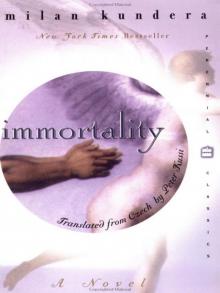 Immortality
Immortality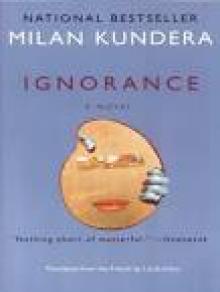 Dr. Havel After Twenty Years
Dr. Havel After Twenty Years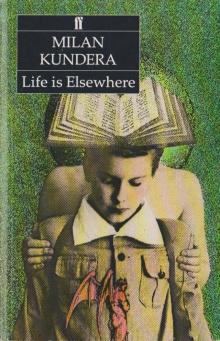 Life Is Elsewhere
Life Is Elsewhere Laughable Loves
Laughable Loves Symposium
Symposium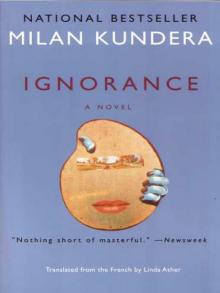 Ignorance
Ignorance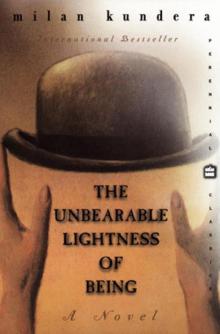 The Unbearable Lightness of Being
The Unbearable Lightness of Being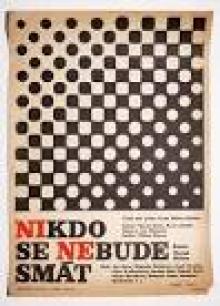 Nobody Will Laugh
Nobody Will Laugh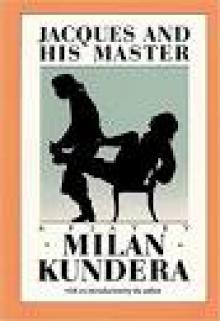 Jacques and His Master: An Homage to Diderot in Three Acts
Jacques and His Master: An Homage to Diderot in Three Acts The Golden Apple of Eternal Desire
The Golden Apple of Eternal Desire Eduard & God
Eduard & God Slowness
Slowness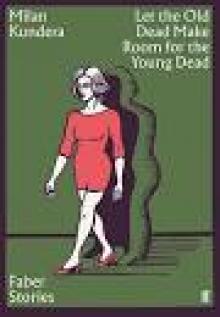 Let the Old Dead Make Room for the New Dead
Let the Old Dead Make Room for the New Dead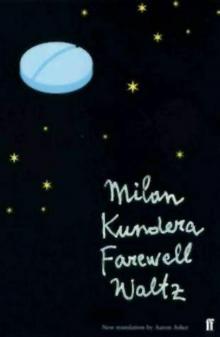 Farewell Waltz
Farewell Waltz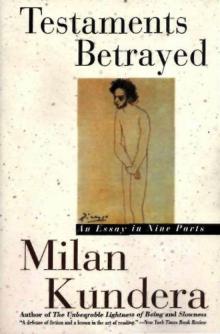 Testaments Betrayed: An Essay in Nine Parts
Testaments Betrayed: An Essay in Nine Parts